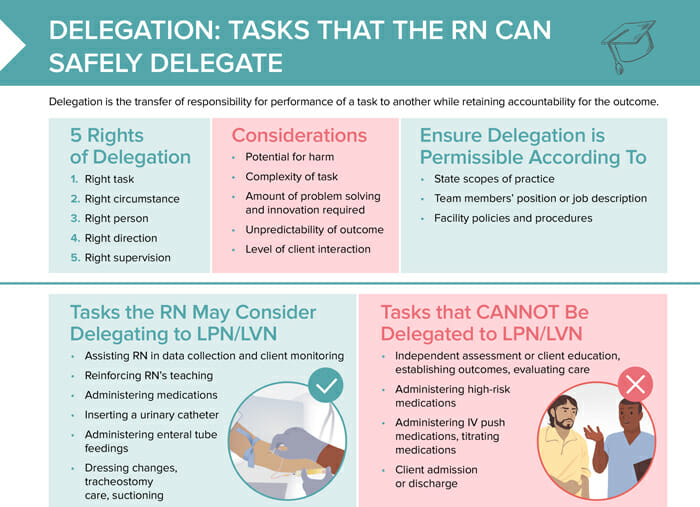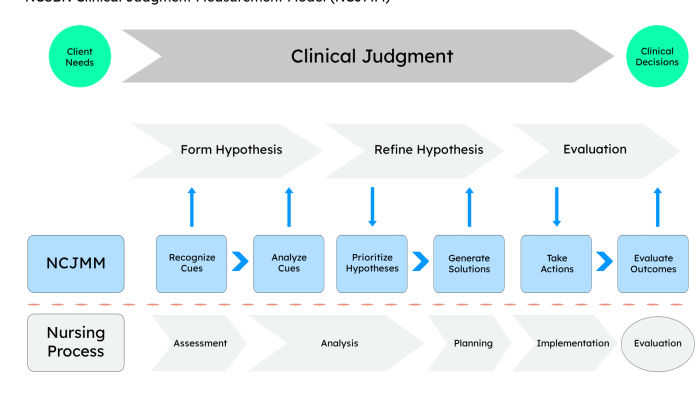Delegation and prioritization in nursing – Delegation and prioritization are fundamental pillars of nursing practice, enabling nurses to provide optimal patient care while ensuring efficient utilization of resources. This article delves into the significance, benefits, challenges, and strategies associated with effective delegation and prioritization in the nursing profession.
Nurses play a crucial role in the healthcare system, and effective delegation and prioritization are essential for managing their responsibilities effectively. By understanding the principles of delegation and prioritization, nurses can improve patient outcomes, reduce errors, and enhance overall patient satisfaction.
Delegation and Prioritization in Nursing

Delegation and prioritization are essential components of nursing practice. Delegation involves assigning tasks to other healthcare professionals, while prioritization involves determining the order in which tasks are completed. Effective delegation and prioritization can improve patient care, increase nurse satisfaction, and reduce the risk of errors.
Importance of Delegation and Prioritization in Nursing
Delegation allows nurses to focus on more complex tasks that require their specialized skills. Prioritization helps nurses to manage their time and resources effectively, ensuring that patients receive the care they need in a timely manner.
Benefits of Delegation and Prioritization
Benefits for Nurses
- Increased job satisfaction
- Improved time management
- Reduced stress levels
Benefits for Patients
- Improved quality of care
- Increased patient satisfaction
- Reduced wait times
Challenges of Delegation and Prioritization
Challenges of Delegation
- Determining which tasks can be delegated
- Finding qualified individuals to delegate to
- Maintaining accountability for delegated tasks
Challenges of Prioritization
- Determining the urgency and importance of tasks
- Managing multiple tasks simultaneously
- Adapting to changing priorities
Strategies for Effective Delegation and Prioritization
Strategies for Effective Delegation
| Step | Action | Outcome |
|---|---|---|
| 1 | Identify tasks that can be delegated | Tasks that do not require specialized skills or knowledge |
| 2 | Select qualified individuals to delegate to | Individuals with the necessary skills, experience, and reliability |
| 3 | Provide clear instructions and expectations | Ensure understanding and minimize errors |
| 4 | Monitor delegated tasks and provide feedback | Maintain accountability and improve performance |
Strategies for Effective Prioritization
| Step | Action | Outcome |
|---|---|---|
| 1 | Identify the most urgent and important tasks | Tasks that require immediate attention or have the highest impact on patient care |
| 2 | Delegate or postpone less urgent tasks | Free up time to focus on critical tasks |
| 3 | Use a prioritization tool (e.g., ABCDE method) | Provide a structured approach to prioritizing tasks |
| 4 | Re-evaluate priorities as needed | Adapt to changing patient needs or unexpected events |
Case Studies in Delegation and Prioritization
Case Study 1: Effective Delegation and Prioritization
A nurse manager delegates the task of changing a patient’s dressing to a certified nursing assistant (CNA). The nurse manager provides clear instructions and monitors the CNA’s performance, ensuring the dressing is changed correctly and the patient’s needs are met.
Case Study 2: Ineffective Delegation and Prioritization
A nurse delegates the task of administering a medication to a nursing student who is not yet qualified to perform this task. The student makes an error in administering the medication, resulting in a patient’s adverse reaction.
Lessons from Case Studies
- Delegation should only be to qualified individuals.
- Clear instructions and expectations are essential for effective delegation.
- Prioritization tools can help nurses manage multiple tasks effectively.
FAQ Section: Delegation And Prioritization In Nursing
What is the primary benefit of delegation in nursing?
Delegation allows nurses to assign appropriate tasks to other qualified healthcare professionals, freeing up their time to focus on more complex and critical patient care responsibilities.
How can nurses effectively prioritize tasks?
Nurses can prioritize tasks using the ABCDE method, which categorizes tasks based on urgency and importance. This method helps nurses determine which tasks require immediate attention and which can be delegated or postponed.
What are some common challenges associated with delegation?
Nurses may face challenges such as resistance from other healthcare professionals, concerns about patient safety, and difficulty in identifying appropriate tasks for delegation.



